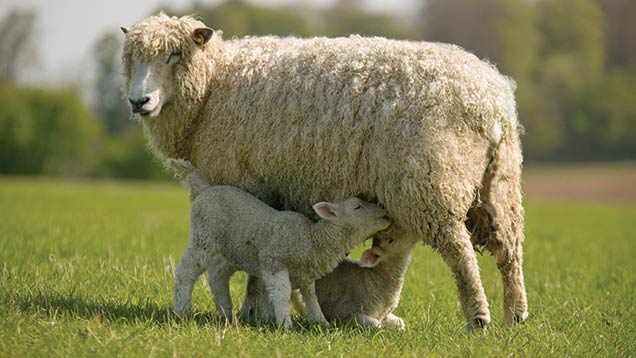Don’t use lamb colostrum supplements as a replacement, farmers warned

Lamb colostrum supplements are not an adequate substitute for ewe colostrum, a Cambridge study has found, despite the fact many farmers use them as a replacement.
Researchers from the University of Cambridge’s Department of Veterinary Medicine found none of 10 supplement products tested contained concentrations of immunoglobulin G (IgG) approaching the 50g/litre (g/L) typically seen in normal ewe colostrum.
Lambs are dependent on colostrum to obtain protective antibodies such as IgG, as the structure of ruminant placenta means no passive transfer of immunity occurs in the uterus.
The Department of Veterinary Medicine team found, however, that none of the tested supplements used alone at recommended volumes would provide more than about 3g of IgG/feed.
“I think they [farmers] are buying a pig in a poke,” lead researcher Murray Corke told Farmers Weekly.
See also: Vet advice for selecting approapriate supplements
“They’re meant as a supplement, but some farmers use them as a replacement,” said Dr Corke. “If the lamb hasn’t enough colostrum from the dam, these colostrum supplements aren’t going to make a great deal of difference, because levels of IgG in colostrum supplements are significantly lower than in ewe colostrum.”
Colostrum and IgG
- Cells take IgG from maternal plasma and secrete it into colostrum during the last days of pregnancy.
- An average ewe will produce about two litres of colostrum in the first 18 hours post-partum.
- The IgG content of colostrum varies between breeds of sheep. For example, Scottish Blackface ewes have been found to have lower IgG colostrum than Suffolk ewes.
- Lambs receiving a lower quantity and quality of colostrum are at increased risk of bacterial gut infections.
Dr Corke believes there is a place for these products, but that every effort should be made to ensure an adequate intake of colostrum before reaching for a supplement.
“I’m not saying they’re not useful,” he said, “but farmers often use them as a quick and easy solution to the problem, rather than harvesting colostrum from sheep with single lambs.
“And like a lot of quick fixes, it’s not going to do the job properly.”
And if ewe colostrum is not available, goat or cow colostrum – ideally harvested from animals on the same farm – is the next best option, he said.
“Goat colostrum should be as good as sheep colostrum,” he said. “We know cow colostrum varies in quality, particularly with dairy cow colostrum, so it would need to be checked to see if it is useful.”
Virtually no immunity
The trial, which was funded by colostrum supplement supplier Agri-Lloyd, also found there were distinct differences in quality between different brands.
Results showed:
- Per feed, Vetplus Lambaid contains more IgG than any of the colostrum supplements tested, at an average of about 3g/150ml.
- Per litre, Downland Lamb Force was found to contain the highest levels of IgG, followed by Vetplus Lambaid, Farmsense Ovicol and Agri-Lloyd Surestart.
In addition, a clinical trial of one supplement, VetPlus Lambaid, using newborn twin Lleyn lambs “found no significant benefit of using the supplement in lambs that were not colostrum deprived”.
Fiona Lovatt, sheep veterinary consultant and founder of Flock Health, said topping up the colostrum intake of well-nourished lambs with supplements could in fact be detrimental.
“There could be a disadvantage as the supplement dilutes the mother’s colostrum, may depress the lamb’s appetite and discourage sucking naturally and the unnecessary use of a stomach tube could increase the risk of disease,” she said.
“Farmers are faced with a very difficult decision in terms of purchasing colostral substitutes,” Dr Lovatt added.
“We know there is no real substitute for the colostrum from the ewe, but for some lambs – when the mother is sick or dead or for some triplets – we need to be realistic and have back-ups available,” she said.
Options to consider before supplements, according to Fiona Lovatt
- Every lamb needs 100ml/kg of ewe colostrum in the first four hours of life, and a total of 200ml/kg before the end of its first day.
- Colostrum from a freshly lambed ewe is definitely the best and it can be really useful to harvest spare colostrum from ewes with singles or those that lose their lambs.
- The IgG levels in actual ewe colostrum are more than twice the levels of even the best powdered versions, so harvested ewe colostrum should be treated like liquid gold.
- Use spotlessly clean containers and keep in the fridge for up to a week or freeze in small portions. Gently defrost for use, don’t be tempted to zap it in a microwave as this will damage the IgG.
- Sheep colostrum is superior to both goat and particularly to cow in terms of protein and energy levels, but it is possible to use either species as a substitute where necessary. Ideally it should be from animals on the same farm and those vaccinated with standard clostridial vaccine.
- Due to the lower levels of energy an extra 30% of cow colostrum should be given to get the same energy levels.
